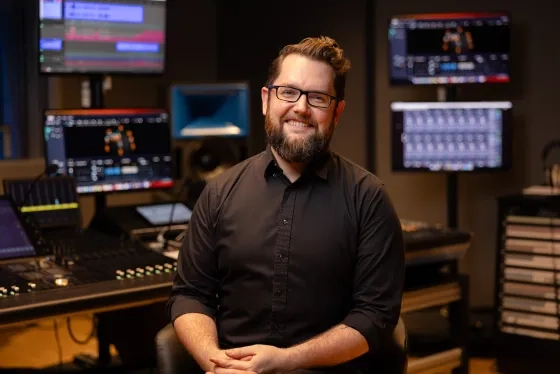Behind the Musical Wizardry of SFCM Studio Manager Doug McCausland
News StoryMcCausland's work sits at the intersection of instrument design, software, artificial intelligence, and neural nets, all of which go into what he teaches Conservatory students.
Doug McCausland is almost certainly the only person at SFCM who has an album by a band called Cattle Decapitation in his list of favorites, but it's a good indication of the wide-ranging approach he takes to his career. McCausland's CV includes a triple-undergraduate degree in music theory/composition, saxophone performance, and music education, as well as master's degrees in "traditional" composition and digital composition/performance. Oh, and a recently completed DMA in composition from Stanford.
Suffice to say, McCausland does much more than manage SFCM's Technology and Applied Composition (TAC) department studios. He also teaches courses on spatial audio, building applications for music, and electronic music performance, as well as a winter term class titled "Into the Weird: Experimental Electronic Music," in which, among other things, his class created a 40-foot feedback instrument out of two tensioned metal Slinkies.
"The main goal of my work here as TAC Department Studio Manager, is to maintain, upgrade, and support TAC Studios A through H, pods A through D and two multi-seat labs," McCausland explains. "I enjoy repairing things and fixing stuff, working with technology, so that's pretty straightforward and rewarding for me." He continues, "The other big part of my job is education, because in addition to the regular courses I teach, private lessons, and my Winter Term class, I also run the TAC Department spatial audio workshop once a week."
"I think the workshop has been really valuable, because a lot of students come in when they're 18 and they're thinking, 'Oh, I'm going to be the next Hans Zimmer,'" McCausland said. "And one of the things that I think is really incredible with the TAC department is that we give them those skills. But we also give them all the other skills that they need to be dangerous in the field once they get out, and that includes being on the cutting-edge of things like spatial audio."
McCausland describes himself as a composer/performer, but explains that within that, his work also concerns "instrument design, software development, and heavy research into what the bleeding edge of the technology sector is for musical creativity." Two examples he gives of that last part are "higher-order Ambisonics, being able to have audio go out to a 56-speaker dome" and "the musical applications of artificial intelligence and neural nets."
The instrument design aspect comes from McCausland's tinkering on guitar, which—despite his degree in saxophone performance—he's considered his main instrument for some time. "I've built handmade circuits where you take the delay chip out of a guitar pedal and add a mic to it and crank the level input to distort it. Building a pedalboard was what got that started, but the problem was that I was always strapped for cash. And the reality is I can buy a Slinky on Amazon for $6."
McCausland traces his interest in guitar and "heavy" music to, funnily enough, the original Mortal Kombat film soundtrack, which featured metal bands like Fear Factory and Napalm Death. His current work, he says, blends the extremity of those sounds with his traditional compositional background.
"I'm the first to say that my work is abrasive at some points," he admits. "It's very extreme. It's very intense. But I'm exploring it in a way that, when you actually start to peel back some of these layers of sounds, you can see how the pieces start to look and say, 'Oh the skeleton of this piece is just counterpoint. It might be timbral counterpoint, but having that kind of background is part of what's important about my work, even if it's not the thing that at the surface is most readily apparent."
McCausland's far-afield interests keep him curious, he says, a quality he wants to pass onto his students. "It's this process that feeds into itself constantly. If the well dries up on compositional creativity, there's always like four other threads to pull on. It's always a rich working place, because there's always work to be done in new things to find and work with."
Learn more about McCausland and the Technology and Applied Composition department at SFCM.
